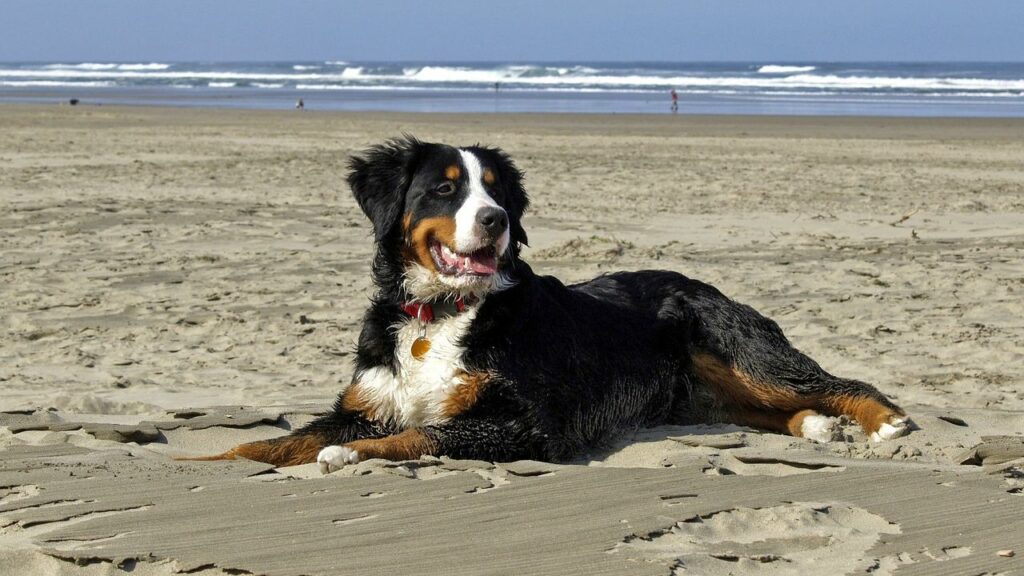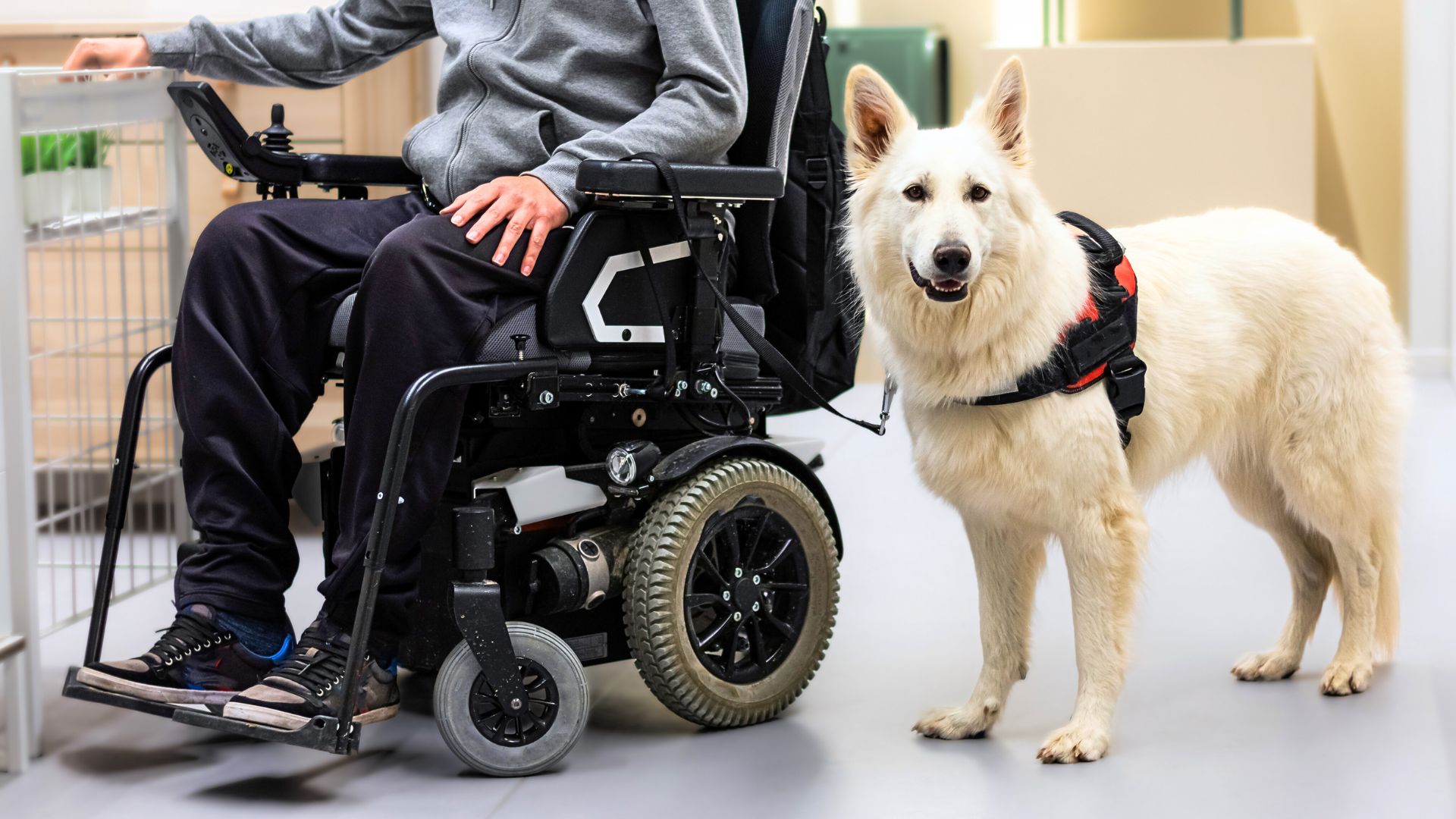Feeling the warmth of a dog’s love can be one of the most heartwarming experiences. Whether it’s cuddling up, petting, or just sharing a peaceful moment, the companionship of a dog is unmatched in its ability to uplift spirits. For individuals with limited mobility, finding the right guard dog involves more than just security; it’s about finding a furry friend who offers companionship, joy, and fits into their lifestyle effortlessly.
Selecting the perfect guard dog for those with limited mobility means looking for breeds that are easy to care for and not too demanding in terms of exercise or space. The benefits of having a pet go beyond companionship, as research has shown positive impacts on both physical health and mental well-being. Integrating a guard dog into your life not only boosts your safety but also enhances your quality of life.

Let’s explore how to find the best guard dogs for individuals with limited mobility, focusing on breeds that bring both protection and happiness without overwhelming care requirements.
Guard Dogs Ideal for People With Limited Mobility
1. Doberman Pinscher

Dobermans are not just fantastic for their protective skills; they’re also incredible support dogs! With their strength and energy, they’re perfectly suited to act as brace dogs, providing assistance when you need it most. Known for their devotion, a Doberman will always stand by your side. They’re brilliant and capable of learning a wide range of tasks to help out their humans.
As part of the working dog breed group, Dobermans excel as Service Dogs. They thrive on mental stimulation and have a natural desire to assist people. Always alert and eager to please, they’re excellent at both detecting and deterring intruders, ensuring their owner’s safety is always a priority. This protective instinct also fosters a deep bond between Dobermans and their owners.
While Dobermans aren’t hypoallergenic, they’re relatively easy to care for grooming-wise. To ensure you’re bringing home a healthy and well-tempered puppy, it’s crucial to choose a reputable breeder.
2. Great Dane

Great Danes are the perfect big buddies for those who need a guard dog but have limited mobility. While they’re not naturally aggressive, their protective instincts are strong, making them top-notch watchdogs. Just their impressive size can keep potential troublemakers at bay. Plus, they’re incredibly loyal to their families, always ready to stand guard.
US Service Animals notes that Great Danes can be excellent service dogs, especially for folks with physical disabilities. Despite their towering height and strength, they know how to be gentle giants. They’re eager to make their owners happy, are extremely loving, and prefer staying close to their human companions.
Caring for a Great Dane is surprisingly straightforward. They’re well-mannered and friendly, with minimal grooming needs—a brush through their coat once a month, or weekly if necessary, is usually sufficient. With their calm demeanor and love for being near you, Great Danes truly make pawfect companions.
3. Cane Corso

Breeds like the Cane Corso stand out as exceptional guard dogs due to their innate loyalty and strong protective instincts. These dogs are naturally inclined to watch over their families, homes, and even livestock with a keen sense of duty, sometimes viewing strangers with suspicion and ready to defend against potential threats.
Their deep connection with their family means they’re always close by, offering protection and companionship to people with limited mobility. Despite their vigilance, Cane Corsos are generally calm and composed, rarely displaying excessive energy or rowdiness. This laid-back nature makes them adaptable to various living situations, provided they have space to move around.
They’re also incredibly sensitive to their owners’ feelings, often reacting to the emotions around them, which strengthens the bond between dog and owner. Grooming is straightforward, with their short, dense coat requiring minimal care, though potential owners should note their tendency to drool.
4. Boxer

Boxers are known for their obedience and warmth, making them excellent candidates for guard dogs. With the right training, they can harness their protective instincts to become incredibly responsive to their owner’s emotions and actions. They stand out for their trainability, showing less inclination to stray or bark unnecessarily.
While Boxers can be expressive, they generally aren’t aggressive. They may let out a protective bark if needed, which suits their role as guard dogs. Welcoming towards strangers yet immensely affectionate with their families and children, Boxers thrive on close bonds. They’re like shadows to their owners, craving both emotional and physical closeness.
For those with an active lifestyle, a Boxer could be the perfect match. This breed demands regular exercise and a solid training regimen to be at their best.
5. Bernese Mountain Dogs

Bernese Mountain Dogs, with their elegance and gentle nature, are not only large and capable animals but also excel in guard work. Known for their extreme friendliness and eagerness to please, they are also physically robust, making them reliable companions for those requiring assistance with physical tasks.
Originally bred to guard farms, the Bernese Mountain Dog is an effective watchdog, alerting its family to strangers with a bark rather than aggression. They may initially be reserved around newcomers but warm up quickly once they see their owner is welcoming.
Pawlicy Advisor highlights that Bernese Mountain Dogs are very smart and enjoy pleasing their owners, making them straightforward to train. They thrive on affection and are sensitive; they respond best to positive reinforcement. Long periods of solitude aren’t ideal for Berners as they prefer being around their family, which helps prevent unwanted behaviors.
Not only are Bernese Mountain Dogs sweet and gentle, making them fantastic with children, but their intelligence also means they can be trained for a variety of tasks, including helping their owners navigate different environments.
6. Border Collie

Collies are known for their protective nature towards their families, though they’re neither aggressive nor excessively territorial. Originating as herding dogs, their instincts are primarily about working in harmony with their humans to ensure the safety of the flock.
Border Collies often form a closer bond with one person, a trait stemming from their history of teaming up with a single handler for herding tasks. Pettable says that their keen awareness of potential threats makes them valuable both for increasing safety at home and as a reliable asset when you’re out and about.
Despite their high energy levels, Collies are relatively low maintenance in terms of grooming. However, “low maintenance” certainly doesn’t mean “no maintenance.” To keep your Collie looking and feeling their best, regular grooming sessions are essential.
7. German Shepherd

Emerging from their roots as herding and guarding dogs, German Shepherds naturally act as protectors for their family and home. Their instinctive vigilance is further refined with proper training, making them reliable guardians.
This intelligent and robust breed forms a strong bond with their owners, ensuring they’re always close by to offer protection. With their capacity to learn quickly and their unwavering loyalty, German Shepherds excel in various service roles, including military and police duties.
Owning a German Shepherd is manageable with the right approach. They can become wonderful companions for people with mobility issues if given consistent training, socialization, enough exercise, and mental challenges to keep them engaged and content.
How to Exercise your Dog with Limited Mobility

Many people with physical impairments might feel unsure about caring for a dog. However, there are numerous strategies to ensure your dog remains active and healthy, making it very possible to provide a loving and enriching environment for your furry friend.
- Playtime: Engage in fun games using traditional toys or brain games. Toys that stimulate your dog’s mind, like feeding puzzles and snuffle mats, are excellent.
- Destruction Boxes: Fill a box with newspaper and hide treats inside. It’s perfect for dogs who love a bit of mess.
- Ball Games: Use dog-friendly launchers and safe balls. Opt for balls on a rope for easy retrieval or ones with air holes for safety.
- Tug of War: A good exercise if you’re able, helps burn off your dog’s excess energy.
Conclusion
For individuals with mobility issues, selecting the right mobility service dog breed can significantly enhance their quality of life. Breeds like the large and gentle Great Dane, the intelligent and trainable German Shepherds, and the loyal Standard Poodles excel as mobility service dogs.
These dogs, known for their size, strength, and keen sensitivity to their owners’ needs, can provide invaluable assistance to those with physical limitations.
Irish Wolfhounds, another huge dog breed, also make excellent companions, offering both support and companionship. When properly trained, these breeds can help navigate the challenges faced by individuals with mobility issues, proving that the right dog breed can be a life-changing ally.












